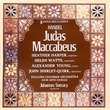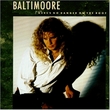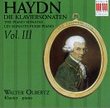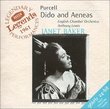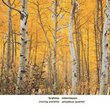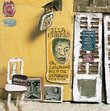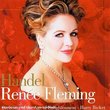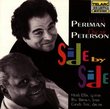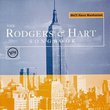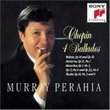| All Artists: Richard [1] Strauss, Bernard Haitink, Eugen Jochum, Royal Concertgebouw Orchestra Title: Richard Strauss: 5 Great Tone Poems Members Wishing: 0 Total Copies: 0 Label: Philips Release Date: 8/16/1994 Genre: Classical Styles: Opera & Classical Vocal, Forms & Genres, Theatrical, Incidental & Program Music Number of Discs: 2 SwapaCD Credits: 2 UPC: 028944228120 |
Search - Richard [1] Strauss, Bernard Haitink, Eugen Jochum :: Richard Strauss: 5 Great Tone Poems
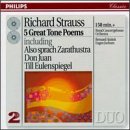 | Richard [1] Strauss, Bernard Haitink, Eugen Jochum Richard Strauss: 5 Great Tone Poems Genre: Classical
|
Larger Image |
CD DetailsSimilar CDs
Similarly Requested CDs
|
CD ReviewsSensational Strauss at an Excellent Price Doug - Haydn Fan | California | 05/24/2008 (5 out of 5 stars) "Before discussing this great reissue I thought I'd give a little provenance to these recordings. Far too many people today simply don't realize these CDs were once long playing records, since the majority of buyers have never owned a record player! Many years ago - when you could buy several gallons of gas for a single dollar - the recording world was all about long playing records. As the sixties ended and the seventies began records made by the major American companies fell into disrepute. The major American companies such as Columbia and RCA insisted on stamping records out like so many beer cans. Since most classical music, unlike most popular music, was made up of silence and soft passages as well as loud passages, classical records needed very quiet surfaces. Thus the across the board collapse in the playing quality of American classical records had a direct and most egregious effect on the classical record consumer's pleasure when attempting to enjoy a purchase. By the middle of the seventies, as gas prices started their endless climb, record companies in America turned to using poorer and poorer grade shellac, while at the same time switching their pressing factories back and forth from pop pressings churned out by the hundreds of thousands straight over to much smaller runs of the more demanding needs of classical issues, with bad results in quality control. These American records were inflicted with a myriad of disturbing and annoying defects; from poor surfaces with endless pops and clicks to completely impossible warpings and scratches. Thinner and thinner records were stamped out - culminating in long playing records so thin you could flex and twist them. The record companies claimed this was a positive, but the buyers knew otherwise. The situation became so bad desperate American classical customers flocked to much more expensive imported European labels, such as DG and Philips and EMI, which maintained certain standards at their pressing plants. Unfortunately these European companies, though turning out smooth playing records with flat unwarped sides and little surface noise, also were obsessed with filtration. Far too many magnificent tapes were only issued after any hint of tape hiss or the like was given the filtering equivalent of nuking. The result was the original musical sounds were attenuated, sometimes severely, and an entire generation of people grew up thinking the limited sound stage of these DGs and Philips was the best possible recording not because the records captured anything like the natural sounds of music, but simply because the imports were free of the distracting and maddening extraneous noises so common to American issues. At the height of this sick situation Haitink appeared on the scene. His best early records displayed a prodigious musical intellect, with the most complex passages brilliantly revealed in the most pellucid fashion. Among several fine recordings his 1974 LP on Philips of the by now notorious Richard Strauss tone poem "Also Sprach Zarathustra" drove critics on both sides of the Atlantic hurrying to their dictionaries for new adjectives of praise. The famous cover of the LP had a stunning red, blue, and yellow collector's specimen of the most superb quartz set floating like a planet or asteroid in a background of bright green. Played on the not so great record players of the day - at least compared to the space age wonders of today - the performance revealed the work as well or better than any so far, with the Concertgebouw playing supremely well. The big drawback was the record split the music up at the convalescent episode, and, too, neither the full weight of the orchestra nor the orchestra hall ambience quite survived the Philips' sales managers filtering dictums. Today we can enjoy much more of the music locked away on the tapes used for those original long playing records. The long playing record has been supplanted by the Compact Disc, at least for all practical purposes. Apart from the microscopic print of the booklets, CDs are in every other way a great advancement in convenience and ease of use. Anyone wishing to buy classical music today is free of all the negatives bedeviling the long playing record. The flickering fireplace complete with popping embers is a thing of the past, and good riddance. Even better, with a few exceptions, most CDs play fine and sound fine after many playings - unlike record buyers who at the height of the quality control collapse were forced to take half their purchases back to the store as unplayable. Philips has partially learned their lessons in regard to over-stripping the music, thankfully, and for this CD reissue hasn't insisted as they once did on removing all the high frequencies. They've also not flattened the ambience to the point of leaving a deadly flatness where there should be sparkle and vitality. Too, and a huge advantage of the CD over the record, we can now finally enjoy the music without interruption. Haitink's sweeping integration of all the tiny details builds to a far more effective culmination than was possible with the interruption necessitated by the time constraints endemic to the long playing record. Further, some of the original compression necessary for long playing records is no longer such an issue for CDs, and there is now more punch to the climaxes, as well as less sonic congestion. The other works strike me as very, very good, all showcasing Haitink as an exalted Straussian. This is a CD any Strauss lover should purchase. Following Strauss from score is never easier than to Haitink, and rarely more pleasureable. Fans of the various alternatives in this music, such as Reiner, Karajan, Kempe, and Krauss will not be disappointed in these immaculately handled readings. Haitink excels in presenting these works with a finish and brilliance more to be expected in diamond cutting than the leading of a symphony orchestra. If not the ne plus ultra in feverish excitement the Haitink performances grip your attention from beginning to end: one ends a bit dazed by such a heightened state of jewel-like playing by the Concertgebouw and its leader. This is another wonderful bargain from Philips' Duo series of reissues." Get this for the wonderful Heldenleben. JPH | Crawley | 08/25/2003 (5 out of 5 stars) "The star of this Duo set is the Heldenleben, which alone is enough to justify the money spent. Hermann Krebbers plays the violin solos magnificently and Haitink gives a strongly expansive reading. However, the same expansive approach does not work too well in "Zarathustra" and "Tod", which have a certain Brucknerian stodginess. You will be left wishing for a bit more pace and brio in the playing. "Don Juan" and "Till Eulenspiegel" are excellently paced and played however. They are among the best performances I have ever heard." Truly great Strauss conducting from Haitink Santa Fe Listener | Santa Fe, NM USA | 09/18/2005 (5 out of 5 stars) "Philips outdid itself with wonderfully warm, clear, detailed sonics for Haitink's Also Sprach Zarathustra, and he obliged the engineers with a detailed reading that is riveting in every way. There is not a touch of Solti's vulgarity, and although I never thought I'd say it, this recording sounds better and comes off more dramatically than even Karajan's more famous accounts of Zarathustra on Decca and Dg. Let's call it a tie. Everything else in the fill-up works is wonderful as well."
|

 Track Listings (8) - Disc #1
Track Listings (8) - Disc #1